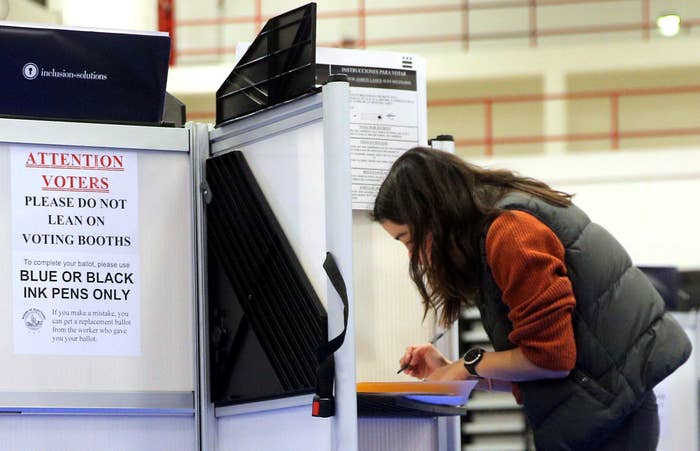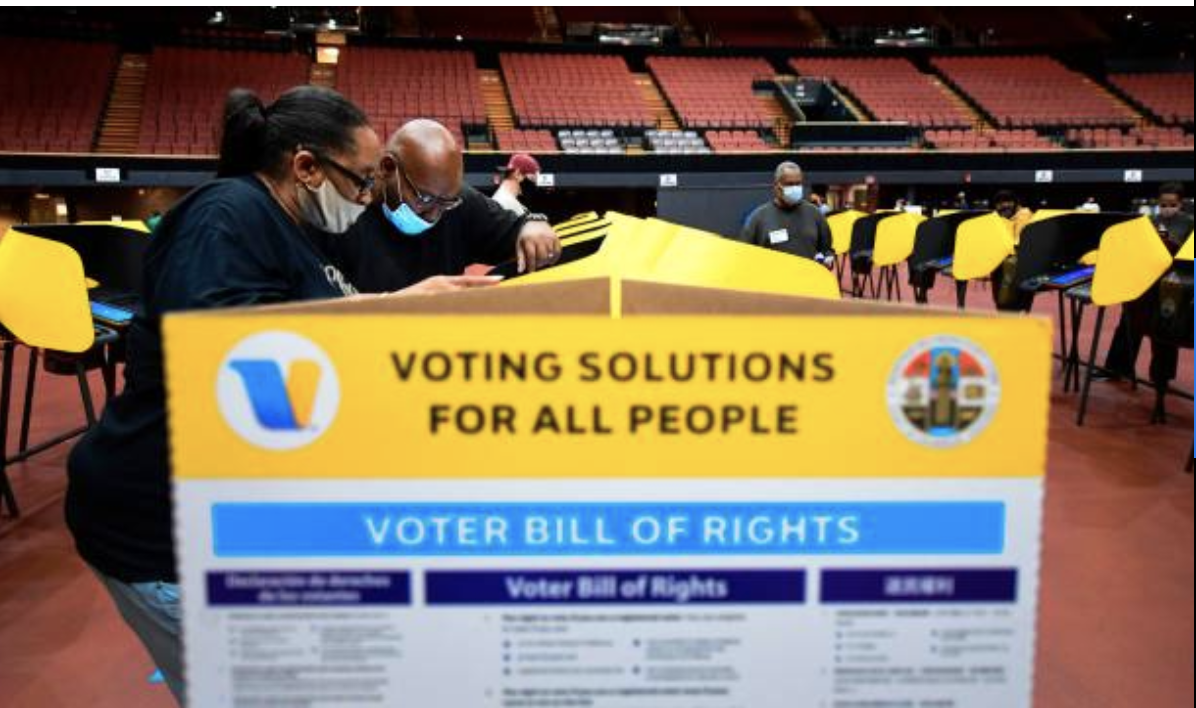
Believe it or not, we've made it to Election Day (deep breath).
While millions of Americans have already cast their ballots, millions more will be heading to polling places today in what many are calling the most high-stakes election of their lifetimes.
They will do so following a bitter campaign in which allegations of voter fraud and voter intimidation have dogged the race, bandied about by, among others, the president himself. At the same time, some have raised alarms that militant groups may patrol polling places and intimidate people trying to vote. For example, this past weekend in Springfield, Oregon, armed groups reportedly intimidated voters at a ballot drop-off box, resulting in some people leaving out of fear. State police said Monday that they were looking into the incident.
Voter intimidation is a crime under federal and state law, no matter where you live. That means it is a crime for someone to ask you about your citizenship as you attempt to vote, or for someone to scream at you as you attempt to vote, or for someone brandishing a gun to block your path to the voting booth. You have a right to cast your ballot peacefully and without interference – and most Americans will. But if you see or experience something that feels aggressive, intimidating, or illegal, there are steps you can take.
"The experience of the vast majority of Americans will be a peaceful election and despite all the challenges — pandemic and new processes — people are turning out in record numbers to vote," said Nealin Parker, director at Princeton University's Bridging Divides Institute. "The tone of this election may have been really polarizing, but the work doesn't stop on Election Day. Rather than making it the culmination of a polarized campaign period, you can make Election Day the beginning of the future you want for our country."
Here are 7 things you can do to protect the right to vote in your community.
1. Know your rights.
Voter intimidation is illegal and carries serious consequences. Its precise definition varies from state to state, but here are the most common tactics, according to a guide from Pennsylvania's Department of State:
- Blocking access to a polling place.
- Physical violence or threatening violence — including brandishing a weapon, no matter a state's open carry laws.
- Asking someone about citizenship, who they are voting for, or their criminal record.
- Disseminating misinformation.
- Taking photos or videos of voters or following them around.
- Shouting or using offensive language and taunting chants.
- Falsely identifying as an election official or law enforcement officer.
If you witness behavior you believe is meant to scare or turn away voters, you can report it easily. 866-our-vote is a national, nonpartisan election protection hotline that's comprised of more than 100 local, state, and national groups and volunteers. The coalition runs hotlines in many languages, including legal help and voter protection field programs. You can also report intimidation to The Election Protection Hotline:1-866-OUR-VOTE or 1-888-VE-Y-VOTA; and the US Department of Justice Voting Rights Hotline:800-253-3931
BuzzFeed News has journalists around the US bringing you trustworthy stories on the 2020 Elections. To help keep this news free, become a member.
2. Ask yourself, do I feel safe? If you don't, document why.
Remember, this is your experience. What feels threatening isn't a static thing, Parker points out, it's how someone else's actions or attitude make you feel. A person's intense support of a candidate at a polling place could make someone feel uncomfortable or fearful. Writing down or recording specific details about the incident is vital: time, location, unique identifiers of a person or group of people. If there's a car involved, try to note the license plate, what the driver was wearing, and other details.
Also: the Second Amendment does not protect extremist activity or self-proclaimed polling guards who are brandishing weapons. Report that shit.
3. If you're an election official, know how to spot and stop voter intimidation.
Polling place volunteers and election officials can approach armed individuals or groups near a polling place and ask them to put away their guns and move away from voters, according to a guide from Georgetown University. You can also set up buffer zones or separate opposing groups if tensions start to rise at your location. If a group or a person refuses to listen to you, it is within your right to call law enforcement and/or legal counsel to step in.

4. Know your space.
Poll monitors are not allowed inside enclosed spaces like voting machines or booths, or immediately around poll workers' tables, the ACLU points out. They also may not directly interact with voters or look over poll books when voters are present.
Campaigning is also not allowed inside a polling place. People can usually advocate for their candidate outside, though the distance they are required to keep from a polling place varies per state. But partisans cannot block an entrance or make it difficult for you to drop off your ballot. Report that shit.
5. Ensure you receive your ballot at a polling place.
If you don't appear on a list of registered voters, ask the poll worker to double-check or ask if there's a supplemental list. As the ACLU notes, you should also ask them to search for you in the statewide system to see if you are registered at a different spot. If you don't come up anywhere, you can ask for a provisional ballot.
"All voters are entitled to a provisional ballot, even if you are not in the poll book. After Election Day, election officials must investigate whether you’re qualified and registered to vote; and if so, they must count your provisional ballot," the ACLU says in their guide.
6. If you need assistance due to language barriers or other factors, you're entitled to it.
Federal law enables voters with disabilities or limited English proficiency to bring someone with them to help them vote. They are not allowed to be turned away because a poll worker doesn't think they have the capacity to vote, the ACLU says.
7. Don't try to change people's minds.
While it feels like we are more divided than ever and it sometimes seems impossible to understand someone else's political point of view, accepting their choice and opinion helps de-escalate a situation, the Bridging Divides Initiative says. If you want your community to be resilient, then help to build it up by reaching out across the aisle when tensions are highest.
"This isn't a time to change minds on voting," Parker said. "Listening without intent to change someone can reduce tensions."
